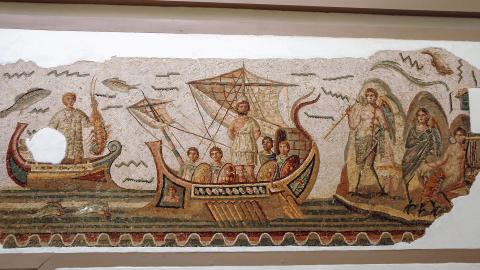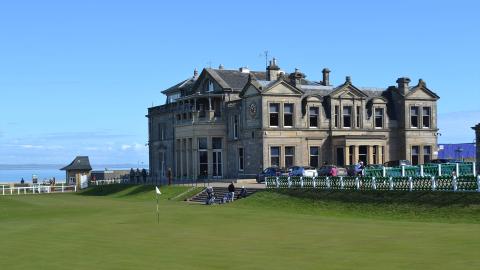
The Pickles Report: Alderney’s hidden history exposed
Published in May 2024, the Pickles Report has finally brought some clarity to the number of prisoners who died in the Nazi concentration camps at Alderney.
Image: Hitler's British Island
Given the sinister codename 'Adolf Island', Alderney became a preoccupation for Hitler and was transformed into one of the most heavily fortified places on earth. Away from prying eyes, the Nazis also established a concentration camp, the only one on British soil. Hitler's British Island will reveal the startling death toll and how Nazi war criminals were allowed to go free. The show starts Tuesday, 15th October on Sky HISTORY.
Alderney, the northernmost of the Channel Islands, is filled with idyllic beaches and populated by a welcoming community. But picturesque as it may be, the island has a dark past, given the fact that it played host to the only Nazi concentration camp on British soil during World War II.
For decades, controversy has surrounded the island’s troubled heritage, with many arguing that the official death tolls fell far short of the actual number and some even describing it as a ‘mini-Auschwitz’. In response, an investigation into the subject was ordered by Lord Pickles in 2023, with the fruits of those labours published the following May.
The conclusions that the report unearthed may finally provide the descendants of the deceased and Alderney’s present-day residents some semblance of closure in the wake of such terrible atrocities.
A troubled past made worse by conspiracy theories
After the British government demilitarised and then evacuated the Channel Islands in 1940, the Nazis swiftly took over. Hitler decided that the archipelago would serve as the perfect springboard from which to attack Britain, with Alderney soon becoming the most fortified of these outposts. At its zenith, Alderney was believed to house 4,000 prisoners from various countries across Europe.
The inmates were ordered to carry out exhausting physical labour, fed with meagre rations and subjected to brutal beatings, with executions not uncommon either. Previous estimates had placed the total death toll on Alderney at 389, though that figure has been subject to intense speculation and dispute for years.
Because almost all of the island’s 1,500 residents were evacuated prior to the Nazi takeover – alongside the fact that the vast majority of the prisoners housed there came from overseas – arriving at definitive figures for the dead had proven to be very difficult.
This uncertainty had been leapt upon by conspiracy theories, who hypothesised that the actual death toll could have been many times higher than the official one. Some even claimed that several thousand people had lost their lives on Alderney, causing understandable distress to its present-day residents.
Clarity and closure at long last
In a bid to clear up the confusion once and for all, Lord Pickles ordered a review of the island’s past in July 2023. ‘Numbers do matter. It is as much of a Holocaust distortion to exaggerate the number of deaths as it is to underplay the numbers,’ he said on publication of the report in May of the following year. ‘The truth can never harm us.’
Compiled by a panel of 11 experts, the Pickles Report sifted through mountains of archival data to arrive at a number of illuminating conclusions, including:
- A minimum of 7,608 prisoners were housed on Alderney throughout the Nazi occupation.
- It is most likely that between 641 and 1,027 people lost their lives during this time.
- The death toll is very unlikely to have exceeded 1,134 people.
- In addition to those who died on the island, a minimum of 97 more died while in transit to or from it, with one more disappearing altogether.
- Detailed lists have been compiled of many of those who died.
- Even if new information comes to light, the final death toll is not expected to increase by more than a few hundred.
Although significantly higher than the previous estimate, these figures are far short of some of those being bandied about prior to its publication. As such, they can put to bed once and for all the damaging conspiracy theories which drew parallels with the genocide perpetrated at sites such as Auschwitz.
An explanation for miscarriage of justice
Another point of contention regarding Alderney’s past centred on the fact that many of those responsible for the atrocities were never brought to justice. For years, no good reason for this anomaly was given by those in charge. In this respect, the Pickles Report was able to provide further clarity.
The panel found that it largely occurred due to the nationality of the victims. Since most of the prisoners were Soviet citizens, the British government took the decision to pass their records onto the Kremlin. However, the USSR authorities chose not to investigate further, so the guilty parties were able to escape judgement and punishment.
The report also concluded that the British government undertook a series of cover-ups to obfuscate this obvious miscarriage of justice. While these outcomes are of course regrettable, the publication of the report has at least provided some much-needed clarity in a subject plagued by confusion.
Residents of the island praised the ‘thorough research' and ‘staggering amount of detail’ contained within the inquiry and will be hopeful that they can now put this painful chapter in Alderney’s history behind them, without ever forgetting the atrocities and tragedies which took place on its shores.



















